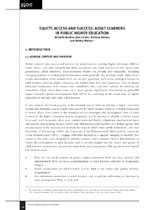Equity, access and success: adult learners in public higher education
Date
2007Author
Buchler, Michelle
Castle, Jane
Osman, Ruksana
Walters, Shirley
Metadata
Show full item recordAbstract
Unlike research into access and success for school-leavers entering higher education (HE) in
South Africa, very little research has been conducted into adult learners in HE. Apart from
generalized, albeit extensive, socio-economic studies on poverty and inequality, including
changing patterns of participation in education more generally (for example, Gelb, 2003), there
is little information, at the systems level, on ‘deeper’ questions, such as the push/pull factors for
adult learners entering higher education, the barriers they face and experience once in higher
education institutions, their success and completion rates, and their reasons for entering HE
institutions. These issues have taken on a much greater significance than before in post-1994
higher education policy developments that call for the widening of the social base of higher
education to include, inter alia, adult learners.
In this context, the broad purpose of the research was to find out whether a higher education
system that facilitates access, equity and success for adult learners exists or is being formulated
in South Africa. One aspect of the research was to investigate the participation rates of adult
learners in the higher education system, in general, and to attempt to identify variables (apart
from age), such as gender, class, race, marital status and family obligations, employment status
and sectors, and funding sources, which may characterize adult learners as a distinct group. The
second aspect of the research was to study the ways in which three public institutions – the Vaal
University of Technology (VUT), the University of the Witwatersrand (Wits) and the University
of the Western Cape (UWC) – engage with adult learners as a ‘special’ category of student. This
aspect of the study was designed to identify systemic and contextual factors that facilitate or
hinder the participation of adult learners, and to provide insights into the nature and quality of
adult learners’ experiences of particular institutions and programmes. The questions that framed
the research were:
• Who are the adult learners in public higher education? How are they defined and
characterized? How are these understandings of adult learners reflected in programme
design?
• Which programmes do adult learners access? What is the nature and quality of these
programmes?
• Are institutions responsive to adult learners, and to policies advocating an increase in
their participation? Why, or why not?

